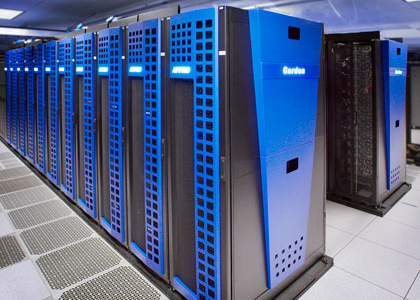Meet Gordon, the World's First SSD-Based Supercomputer
Gordon is now ranked as #48 on the official Top 500 list of the fastest supercomputers in the world.
The San Diego Supercomputer Center (SDSC) reports that the world's first supercomputer based on SSDs came online last week using 1,024 high-performance Intel 710 series drives. It's also using software designed to aggregate resources from multiple physical server nodes into "super nodes." This grants users immediate access to data so that they don't have to wait for the system to access specific drives.
Named Gordon (as in Flash Gordon), the supercomputer uses 300 TB of flash-based storage to run massive databases up to ten times faster than traditional memory. It will officially become a research tool in early January and have 16,384 compute cores, a theoretical peak performance of 280+ Teraflops per second, and aggregate flash memory capable of reading and writing at just over 200 GB per second.
"Think of Gordon as the world’s largest thumb drive, but with the capability to ingest about 220 movies per second from Netflix, or consume the entire catalog of about 100,000 Netflix movies – while still having room for another 200,000 titles," the SDSC muses. "That’s a lot of popcorn."
Last week the SDSC said Gordon uses 64 TB of RAM, 4 PB of disk storage, performs at 36 million IOPS (input/output operations per second), and comes with a hefty pricetag of $20 million USD paid by the National Science Foundation (NSF). Gordon is also now ranked at #48 on the official Top 500 list of the fastest supercomputers in the world, and deemed the most powerful supercomputer ever commissioned by the NSF for doing I/O and breaking the previous (2010) record of only 4.2 million IOPS.
“The era of data-intensive supercomputing begins with Gordon,” said SDSC Director Michael Norman. Every year we double the amount of information being generated, and we now are being overwhelmed by the data we are able to produce with our own computers. So it stands to reason that we needed a new kind of computer."
To read more about Gordon, head here.
Get Tom's Hardware's best news and in-depth reviews, straight to your inbox.

Kevin Parrish has over a decade of experience as a writer, editor, and product tester. His work focused on computer hardware, networking equipment, smartphones, tablets, gaming consoles, and other internet-connected devices. His work has appeared in Tom's Hardware, Tom's Guide, Maximum PC, Digital Trends, Android Authority, How-To Geek, Lifewire, and others.
-
Pyree Well, we can now use this as part of an evidence to debunk myth about MLC SSD's unreliability and lack of longevity. Well done San Diego Supercomputer Center, an excellent choice of storage hardware.Reply -
darkchazz Well I don't know about the specs, but if it can play Crysis then it's good enough...Reply
:P -
de5_Roy i wonder what kind of processors it uses.Reply
can it plaaaaaaayyyyyyyyy metro 2033 at max? -
stingstang Dear Gordon, as I am sure you are reading this, and everything anyone else is typing on the internet, I believe you to be the superior being, and would gladly serve you and do your bidding.Reply
0k gyz, w3 h4v3 2 t3a/\/\ ^ 2 b34t 7h15 7h1ng. -
rosen380 "a theoretical peak performance of 280+ Teraflops per second"Reply
Teraflops is 'trillions of floating point operations per second', so no need for 'per second' following it.
